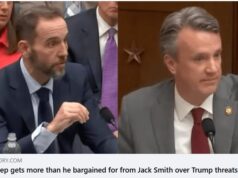 Let me tell you a cautionary tale about the Huffington Post. One of their usually better reporters, Sam Stein, back in January 2009, did a story about a holiday party in the waning days of the Bush administration. It was held in the Treasury Department’s Cash Room, and Stein, while admitting that the party would not be a “blowout” excoriated Secretary Henry Paulson for hosting a gathering in something called a “cash room” during the worst days of the financial meltdown when Paulson was trying to get TARP money out of Congress for the bailout. Stein said, “But the fact that they chose to host the party in the “Cash Room” is either an overt attempt at contemporary humor or a subconscious-influenced coincidence. Either way, it’s ironic.”
Let me tell you a cautionary tale about the Huffington Post. One of their usually better reporters, Sam Stein, back in January 2009, did a story about a holiday party in the waning days of the Bush administration. It was held in the Treasury Department’s Cash Room, and Stein, while admitting that the party would not be a “blowout” excoriated Secretary Henry Paulson for hosting a gathering in something called a “cash room” during the worst days of the financial meltdown when Paulson was trying to get TARP money out of Congress for the bailout. Stein said, “But the fact that they chose to host the party in the “Cash Room” is either an overt attempt at contemporary humor or a subconscious-influenced coincidence. Either way, it’s ironic.”
The problem with that article is that Stein never asked or got a quote from anybody at Treasury about it. If he had, he might have learned that the room was called the Cash Room because it had historically been a working bank located at Treasury up until the early 1970s. Federal employees used to go there to cash their paychecks. After the bank closed, the room was turned into a large meeting room and auditorium. Special events of all sorts, especially employee assemblies and parties were held there.
Treasury’s headquarters, Departmental Offices, is not a large building and it has no formal auditorium. The Cash Room, an ornate historic venue, which once held an inauguration ball, was turned into a place to hold receptions including holiday parties. The party Stein was referring to was a holiday party for employees and their families and friends, not an exclusive and extravagant soiree for muckety-mucks, as the reporter implied.
Why does this matter?
Because the Huffington Post’s reports should be taken with a grain of salt, just as most media reports should be. I don’t single them out because they are particularly bad but because their journalistic standards are sometimes subpar even among relatively good reporters. Below is another example that should be noted, but taken with skepticism too, and investigated further.
Zach Carter, the Huffington Post’s senior Political Economy reporter penned a piece about Tim Kaine supporting bank deregulation. He cited two letters, one that Kaine failed to sign and one that he did sign. They were on two different banking issues and it was disingenuous to conflate them to make Kaine look like he is for bank deregulation. Let’s start with the first letter.
This was a letter to Richard Cordray, Director of the Consumer Financial Protection Board. The signers specifically expressed concern with small dollar loans, popularly known as payday lending. These loans often carry 300 percent interest, and 80 percent of borrowers roll them over into still more onerous payday loans when they fail to pay the original one back. One in five borrowers default on those loans. Yes, they are a bane on the banking industry and cause harm to poor people.
So those who signed the letter to Cordray asked that a proposed CFPB rule implement stronger regulations for these lending institutions, such as requiring them to consider the borrower’s ability to pay and their loan history before making the loans. They also asked the CFPB to reconsider an exemption to the six-loan per year policy, further limiting the amount of loans borrowers can make in one year to less than the current six.
After reading the letter, I think it’s a good idea and agree with those who signed on. Unfortunately, Tim Kaine was not one of them. I think he should have been. I would be curious about why he didn’t. I will get back to that point in a minute.
But the other example of being anti-regulation was an entirely different issue. That involved a request to the CFPB to tailor its rules to community banks and credit unions and not to hold them to the same standards as large multinational investment banks, such as Goldman Sachs. This issue very specifically involves the so-called stress tests to make sure that large investment banks have enough liquidity to survive a banking crisis like the one that caused the economic meltdown in 2008. The letter writers pointed out that community banks and credit unions had nothing to do with that economic crisis or the practices that caused it. In fact, most of these banks play a unique role in their communities, serving the needs of small businesses and individual borrowers. They are neither national nor global in scope. They are regional and usually involved in their communities.
All the letter asks is that Cordray and others involved in the rulemaking process consider the differences between community banks and credit unions versus the large national banks, including the levels of risk involved. Before a rule is applied across the board, an analysis of how burdensome that regulation is and how much risk is involved in not regulating should be made. All this letter asks is that those factors be taken into consideration. On that one, I think Tim Kaine and other signers, including Mark Warner, may be right.
Personally, I am all for regulating businesses and institutions to ensure safety, fairness, and a level playing field. I am far from an anti-regulatory, anti-government ideologue. But I am also not a knee jerk anti-business zealot either. If one particular rule is misplaced, burdensome, and doesn’t solve a real need or mitigate an actual risk, it probably should not be implemented.
That said, whenever a reporter writes up a story that is critical of somebody, that subject deserves to be contacted, interviewed, and allowed to explain their point of view. That is the most fundamental rule of professional journalism. Frankly, stories like the Sam Stein story back in 2009 and this one would not have even made it into my high school newspaper, let alone a professional media outlet without a quote from the subject. Readers do want to know their point of view and why they did or did not do something. But what if the reporter tries and the subject refuses to answer?
Then that should be in the article too. A good reporter always makes the ask. And always reports if the subject refuses to respond. But I don’t see that refusal anywhere in the article. Remember, that type of sloppiness – not checking sources – got a certain Rolling Stone reporter in trouble too.
Right now, this is not a piece of solid reporting. It is an opinion piece or an editorial and not a particularly fair one either.



![Video: Former Eastern District of VA Federal Prosecutor Gene Rossi Asks, “Is Donald Trump going to be the lead counsel in that prosecution [of Jim Comey] and do the opening, closing and rebuttal? I pray that he does!”](https://bluevirginia.us/wp-content/uploads/2025/09/rossiedva-238x178.jpg)







